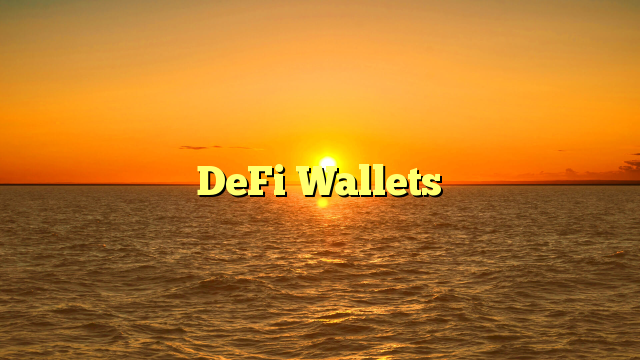DeFi wallets has surfaced as a revolutionary idea. But to participate in this exciting new financial landscape, you’ll need a secure and user-friendly DeFi wallet. This comprehensive guide digs into decentralized finance (DeFi) wallets, exploring their origin, effectuality, key considerations, and the top 10 platforms to watch.
What is a DeFi Wallet?
Imagine a digital safe that lets you interact directly with DeFi applications without relying on a central authority like a bank. That’s the essence of a DeFi wallet. Unlike traditional crypto exchange wallets, DeFi wallets give you complete control over your private keys, the digital keys that unlock your cryptocurrency holdings. This empowers you to manage your assets, swap tokens, earn interest through DeFi protocols, and take part in decentralized governance models.
Origin and Evolution of DeFi wallet
The idea of DeFi wallets came alongside the surface of DeFi itself. In 2016, the DAO (Decentralized Autonomous Organization) craze highlighted the importance of peer-to-peer financial services on the blockchain. However, the lack of a user-friendly team for interacting with DeFi protocols stops widespread adoption.
In 2017, MetaMask, a browser extension wallet, became a game-changer. It offered a flawless way to connect users with Ethereum-based DeFi apps. Since then, the DeFi wallet outlook has been discharged, with numerous platforms supplying different needs and blockchains.
How Does a DeFi Wallet Work?
DeFi wallets operate basically, differently from traditional crypto exchange wallets. Here’s a simplified breakdown:
Centralized Exchange (CEX) Wallets: You deposit your crypto into a custodial account controlled by the exchange. They handle security and transactions, but you abandon some control.
DeFi Wallets: You hold your private keys directly on your device or within the wallet’s software. This grants complete control over your assets and interaction with DeFi apps.
DeFi wallets typically connect to DeFi protocols through a process called “wallet connect.” This allows you to interact with DeFi benefits like swapping tokens, earning interest by lending your crypto, and participating in governance votes.
Key Considerations and Milestones for Choosing a DeFi Wallet.
Selecting the right DeFi wallet is important. Here are some key factors to consider:
Security: This is paramount. Look for wallets with strong security features like double authentication (MFA), secure seed phrase storage, and a good reputation for resisting hacks.
Supported Blockchains: Different DeFi wallets support various blockchains (e.g., Ethereum, Binance Smart Chain). Choose one compatible with the DeFi protocols you intend to use.
User Interface (UI): A user-friendly link is essential, especially for beginners. Look for a wallet with clear navigation and inherent features.
Supported DeFi Applications: Ensure the wallet merge with the DeFi apps you’re interested in (e..g., Uniswap, Aave).
Fees: Some wallets may charge transaction fees for interacting with DeFi protocols. Consider the associated costs.
Here are some milestones to look for when evaluating a DeFi wallet’s development:
Security Audits: personal security audits by reputable firms provide confidence in the wallet’s validity.
Community Growth: A large and active user base indicates a trustworthy platform.
Team Experience: Having a team with a strong track record in blockchain security and development is a positive sign.
A Comparison of DeFi Wallet Types
DeFi wallets can be broadly categorized into two main types:
Hot Wallets: These are software-based wallets that offer comfort but are generally considered less secure due to their online nature. Popular hot wallets for DeFi include MetaMask, Trust Wallet, and Argent Wallet.
Cold Wallets: These are hardware wallets that store your private keys offline, offering the highest level of security. Popular cold wallets with DeFi use include Ledger Nano S and Trezor Model One.
Top 10 DeFi Wallet Projects to Watch in 2024
The DeFi wallet space is constantly developing, but here are 10 of the most promising platforms to consider in 2024:
MetaMask: The undisputed leader, MetaMask is a browser extension wallet offering a user-friendly interface and extensive support for Ethereum-based DeFi applications. (Source: [insert source about MetaMask’s market share])
Trust Wallet: A mobile wallet developed by Binance, Trust Wallet provides a secure and convenient platform for storing various cryptocurrencies and interacting with DeFi apps across multiple blockchains.
Argent Wallet: Designed specifically for DeFi, Argent Wallet boasts a user-friendly link ideal for beginners. It offers social recovery features for added security and links with a wide range of DeFi protocols.
Ledger Nano S: A leading hardware wallet provider, Ledger Nano S offers unmatched security for your DeFi holdings. While not directly a software wallet, it can connect to various DeFi apps through its companion software for secure interaction.
Trezor Model One: Another popular hardware wallet option, Trezor Model One prioritizes security with offline storage of your private keys. Similar to Ledger, it connects to DeFi applications through its Trezor Suite software for secure transactions.
Crypto.com DeFi Wallet: This non-custodial wallet DeFi Crypto.com allows you to manage your crypto assets and connect with various DeFi protocols directly within the app. It supports multiple blockchains for added flexibility.
Guarda Wallet: A multi-currency wallet with a built-in exchange, Guarda Wallet offers a user-friendly platform for managing your crypto holdings and interacting with DeFi applications.
Coinbase Wallet: This self-custody wallet from Coinbase allows you to store various cryptocurrencies and connect with DeFi apps directly within the interface. It prioritizes user experience with a focus on mobile accessibility.
Eidoo Wallet: A multi-chain wallet with a focus on security and privacy, Eidoo Wallet caters to DeFi users seeking a secure platform for managing assets and interacting with different DeFi protocols.
Bitget Wallet: A newcomer on the scene, Bitget Wallet offers a multi-chain Web3 experience with integrated DeFi functionalities. It allows users to connect to various DeFi apps and manage their crypto assets seamlessly.
Opportunities and Challenges of DeFi Wallets
DeFi wallets unlock a world of financial opportunities:
Unmediated Access: Participate directly in DeFi protocols like lending, borrowing, and staking without relying on a central authority.
Enhanced Control: Manage your crypto assets and private keys with complete autonomy.
Evolving DeFi Landscape: Explore a vast and ever-growing ecosystem of DeFi applications.
However, challenges also exist:
Security Risks: DeFi wallets place the responsibility of security on the user. Hacking attacks, malware, and user error can lead to important losses.
Complexity for Beginners: sailing the DeFi ecosystem can be amazing for newcomers. Understanding DeFi protocols and potential risks requires research and education.
Regulation Uncertainty: The regulatory outlook surrounding DeFi is still developing, which can pose challenges for users and wallet providers.
The Future of DeFi Wallets
The future of DeFi wallets is bright. Here are some anticipated developments:
Improved Security: Advancements in cryptography and user education will enhance the security of DeFi wallets.
Simplified User Interfaces: More user-friendly connections will make DeFi accessible to a wide audience.
Interoperability: Wallets that suitably connect to various blockchains and DeFi protocols will become the norm.
Regulation and Integration: As DeFi matures, regulations might develop to provide greater user protection and encourage institutional adoption. This could lead to integration of DeFi capability even in traditional finance.
Conclusion
DeFi wallets empower users to participate in a decentralized financial revolution. By understanding their use, key considerations, and the top platforms available, you can make informed decisions about managing your crypto assets and exploring the exciting world of DeFi. Remember, stay vigilant about security, conduct thorough research, and choose a DeFi wallet that aligns with your needs and risk tolerance. As the DeFi outlook continues to develop, these digital safeties will play a crucial role in shaping the future of finance.






Pingback: 1000x Pumps - Crypto Learning Hub
Pingback: RWAs In Crypto - Crypto Learning Hub
Pingback: Crypto Launched In April 2024 - Crypto Learning Hub
Pingback: Ways To Make Money In Crypto - Crypto Learning Hub
Pingback: How To Calculate Crypto Gains - Crypto Learning Hub
Pingback: What Is A Dao Space In Crypto - Crypto Learning Hub
Pingback: What Is Polkadot Crypto? - Crypto Learning Hub
Pingback: What Is An Injective Protocol In Crypto - Crypto Learning Hub
Pingback: What Is Defi Crypto? - Crypto Learning Hub